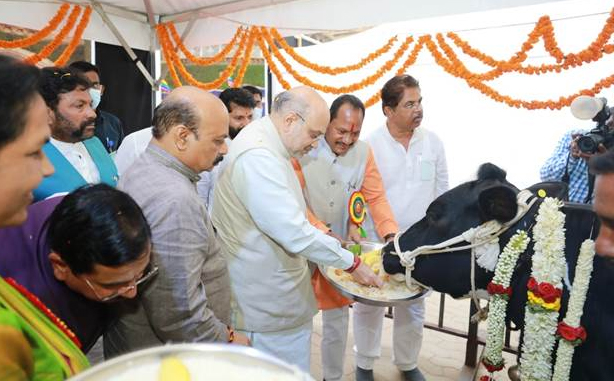Addressing a Cooperative Conference in Bengaluru, Union Minister Amit Shah said Prime Minister, Shri Narendra Modi, has placed the mission of creating prosperity through cooperatives and has provided a conducive ecosystem for the same and now it is up to us to take the advantage.
“Modi has made efforts to double the income of farmers, which includes FPOs, strengthening PACS, formation of the Ministry of Cooperation, strengthening fisheries and milk production. The PM has put forward many measures to double the income of farmers. As the first ever minister of cooperation, I feel that the cooperative movement has a big role to play in achieving these targets”, said Shah.
On the occasion the minister also launched the logo of “Nandini Ksheera Samurdhi Sahakar Bank ” and virtual inauguration of Souharda Sahakari Soudha. Many dignitaries including Union Minister Pralhad Joshi and Chief Minister of Karnataka Basavaraj Bommai were present.
It is said that India’s first cooperative society was established in 1905 in a village in Gadag district of Karnataka. On the eve of Amrut Kaal, we have to take a pledge that when the country celebrates its 100th Year of Independence, the role of cooperatives in every village of Karnataka, will be transparent, Shah exhorted.
There is huge potential for the cooperative movement in the days ahead, but there are some challenges as well. If we do not face these challenges then we will not be able to hand over the cooperative movement to future generations, he stated.
Shah said transparency must be brought into the election process in cooperatives, recruitment must be made
Shah said the Ministry of Cooperation has divided the country into three parts. Developed states from the cooperative point of view, developing states from cooperative point of view and under developed states from cooperative point of view.
By having a different strategy for these three parts, the Government is committed to take the cooperative movement to every village. I am sure that the cooperative movement in Karnataka will take this as a challenge and it will reach every village in the state. He said today I want to convey that many people make fun of the cooperative movement. Those who make fun of the movement, call it outdated. Therefore, I want to place some figures before all of you.
Listing its contributions, Shah said the cooperative sector provides 25 percent of the agricultural credit given in the country, 35 percent of fertilizer is distributed by the cooperative sector, 25 percent of fertilizer production, 31 percent of sugar production, 29 percent of milk production, more than 16 percent of milk is procured by the cooperative sector, more than 15 percent of wheat is procured by the cooperative sector and more than 20 percent of paddy is procured by the sector and business generated through fisheries is more than 21 percent.
We all should set new goals in all these areas and strategies should be formulated at the state and country level to achieve these new goals, Shah concluded.
